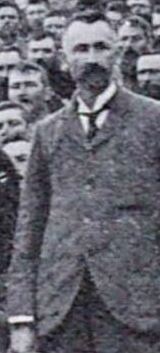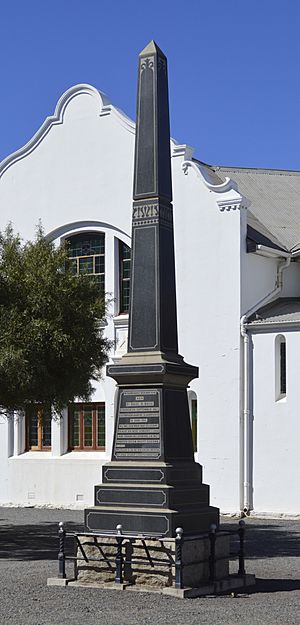Paul Hendrik Roux facts for kids
Quick facts for kids
Paul Hendrik Roux
|
|
|---|---|
 |
|
| Personal details | |
| Born | 28 September 1862 Hopetown, South Africa |
| Died | June 8, 1911 (aged 48) Beaufort-Wes, South Africa |
| Nationality | Afrikaner |
| Spouse | Hester Helena Eksteen (1864-?) |
| Alma mater | Stellenbosch |
| Profession | Protestant pastor, Boer general |
| Military service | |
| Allegiance | |
| Years of service | 1899-1902 |
| Rank | General |
| Commands | Brandwater Basin |
| Battles/wars | Second Boer War |
Paul Hendrik Roux (born September 28, 1862, in Hopetown, Cape Colony – died June 8, 1911, in Beaufort-Wes, Cape Province) was an important figure in South African history. He was a Protestant pastor (a religious leader) in the Dutch Reformed Church in South Africa (NGK). He also became a general during the Second Boer War.
Contents
Early Life and Becoming a Pastor (1862-1899)
Paul Hendrik Roux was born in 1862 in the Cape Colony. He was the oldest son of Dirk Hendrik Dietz Roux and Francina Johanna Roux.
He went to the Stellenbosch Theological Institute from 1884 to 1889. After his studies, he became an ordained pastor in 1891. He first worked as an assistant pastor in Johannesburg. Later, he became a full pastor in Vredefort in the Orange Free State in 1891. In 1897, he moved to Senekal to serve as a pastor there.
Role in the Second Boer War (1899-1902)
Serving as a Chaplain and General
When the Second Boer War began in 1899, Paul Roux joined the troops from his hometown of Senekal. At first, he served as an almoner, which means he was a chaplain who provided spiritual support to the soldiers. He worked with the troops in the Colony of Natal.
Later, the president of the Orange Free State, M. T. Steyn, appointed Paul Roux as a general. This happened after another general, de Villiers, was badly wounded. In July 1900, General Roux joined General Christiaan de Wet's commando (a military unit) in the Brandwater Basin.
Capture and Time as a Prisoner
During the war, General Marthinus Prinsloo and his men were protecting mountain passes in the Drakensberg mountains. The plan was for General De Wet to escape north with 2,000 men, and General Paul Roux to go southwest with another 2,000 men. General Jonathan Crowther would head east with 500 men.
General De Wet did manage to escape with President Steyn. However, the rest of the army hesitated. They failed to defend one pass and gave up another after a fight on July 23-24, 1900.
General Prinsloo and General Roux disagreed about who was in charge. A vote was taken, and at first, Prinsloo was chosen. But later votes showed Roux had more support. The British army surrounded Prinsloo's forces by blocking several passes. Because of this, Prinsloo felt he had to surrender with all his troops to General Archibald Hunter on 30 July 1900.
Paul Roux disagreed with this surrender. He went to General Hunter to protest, but he was arrested on the spot. About 4,300 Boer troops, including Prinsloo, Roux, and Crowther, were taken as prisoners of war near Fouriesburg. Most of them surrendered at a place called Surrender Hill. This was the largest number of Boers captured in the war up to that point.
The British sent most of these prisoners to Diyatalawa in Ceylon (which is now Sri Lanka). Paul Roux was among them. While he was a prisoner, he continued to work as a pastor, helping and supporting his fellow prisoners. Some people in the Boer forces felt that Prinsloo's surrender was a very bad act. Christiaan de Wet even called it "a horrible murder of government, country and people."
Life After the War (1902-1911)
After the war ended in 1902, Paul Roux returned from his imprisonment in Ceylon. He went back to his work as a Dutch Reformed pastor in Senekal.
In 1905, he became the pastor in Beaufort-Wes. He passed away there in 1911. He died from sleeping sickness (also known as African trypanosomiasis). He likely caught this illness during his missionary work in Nyasaland, which is now the country of Malawi.
To honor him, a memorial monument was built in 1915 near the Dutch Reformed Church in Beaufort West. Also, a town in South Africa, Paul Roux, was named after him.
See also
- Paul Roux, the South African town named after him


